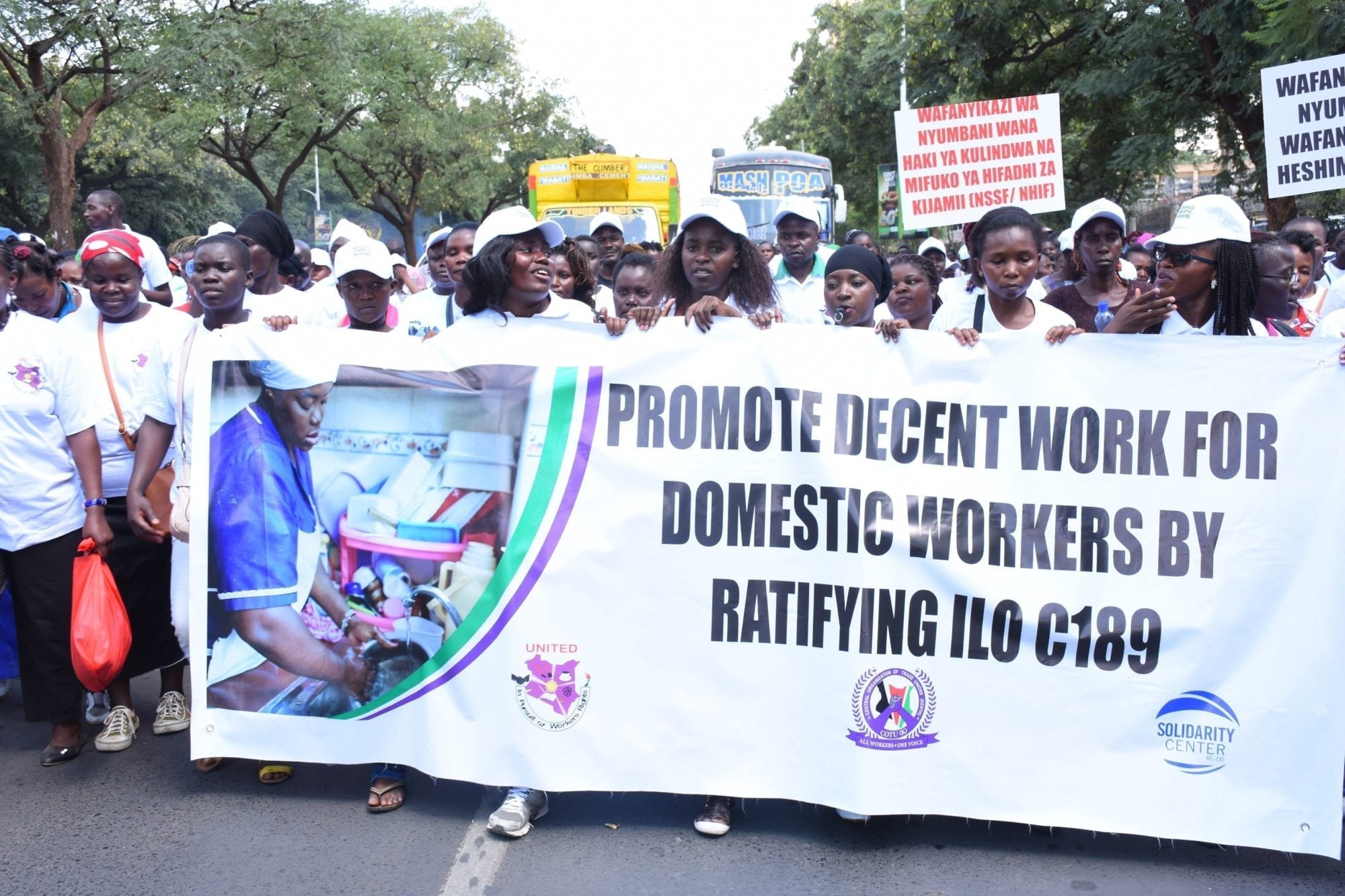
Jun 14, 2018
Domestic workers are some of the world’s most vulnerable workers, comprising a significant part of the global workforce in informal employment. Lucy Nyangasi, 26, a domestic worker in Nairobi, is one of some 67 million workers who labor in households around the world, often in isolation and at risk of exploitation and abuse. The Kenya Union of Domestic, Hotel, Educational Institutions, Hospitals and Allied Workers (KUDHEIHA) is attempting to improve the working conditions and wages of domestic workers like Lucy, as well as those who migrate out of the country for work, with the support of the Solidarity Center.
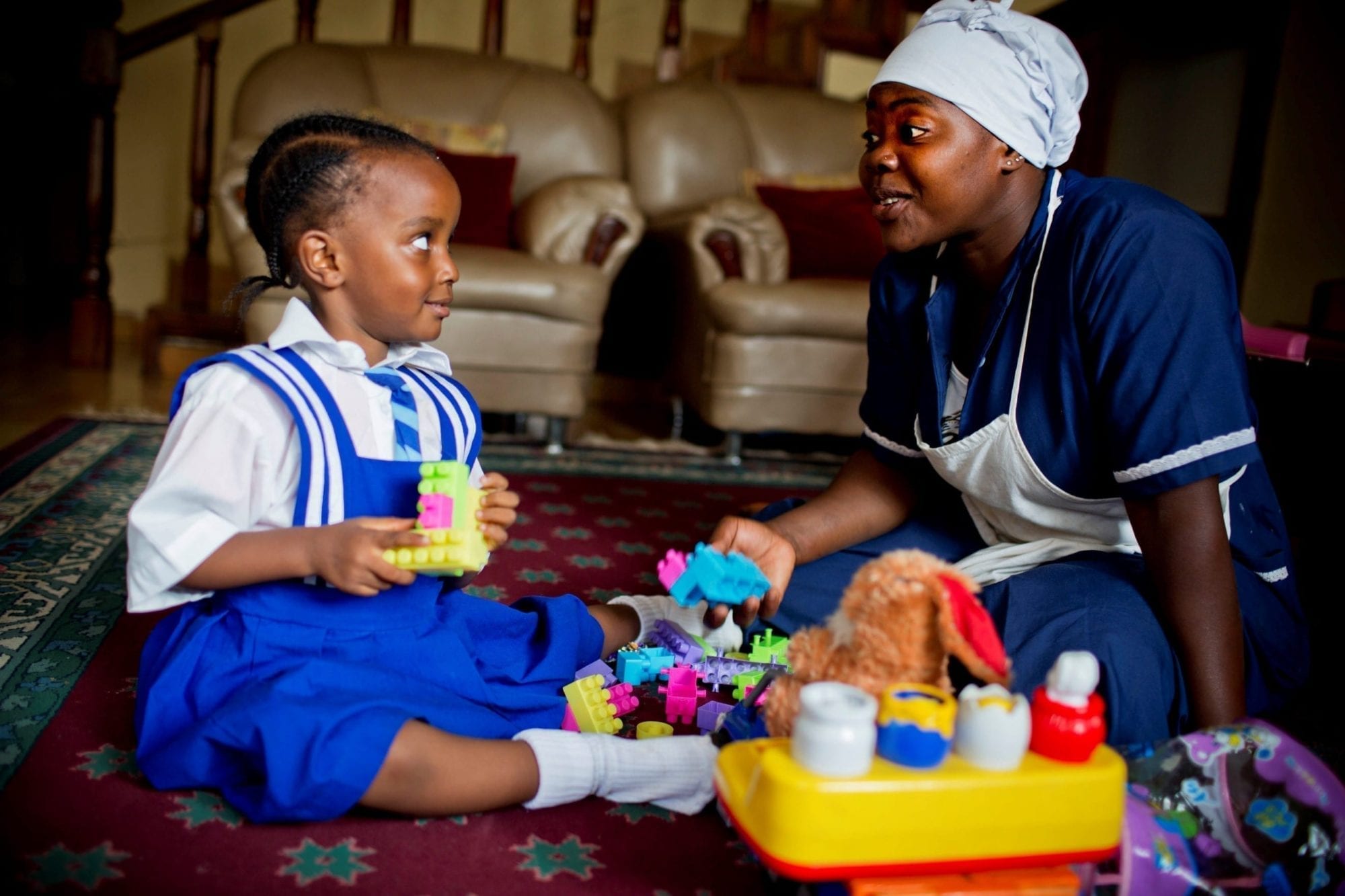
Fighting back against exploitation, during the past year, domestic workers organized by KUDHEIHA joined with allies in hosting a series of public informational forums in the Mombasa area to educate domestic worker migrants about their rights, and rallied in Nairobi for ratification by Parliament of International Labor Organization (ILO) Convention 189, Decent Work for Domestic Workers.
In Mombasa, to educate communities that send domestic workers to the Middle East about migrant worker rights, KUDHEIHA joined with allies in hosting a series of public informational forums throughout the area during the month of August last year. Local migrant worker and anti-human trafficking organizations, TRACE Kenya, Haki Africa and the Kenya National Commission on Human Rights helped support the events.
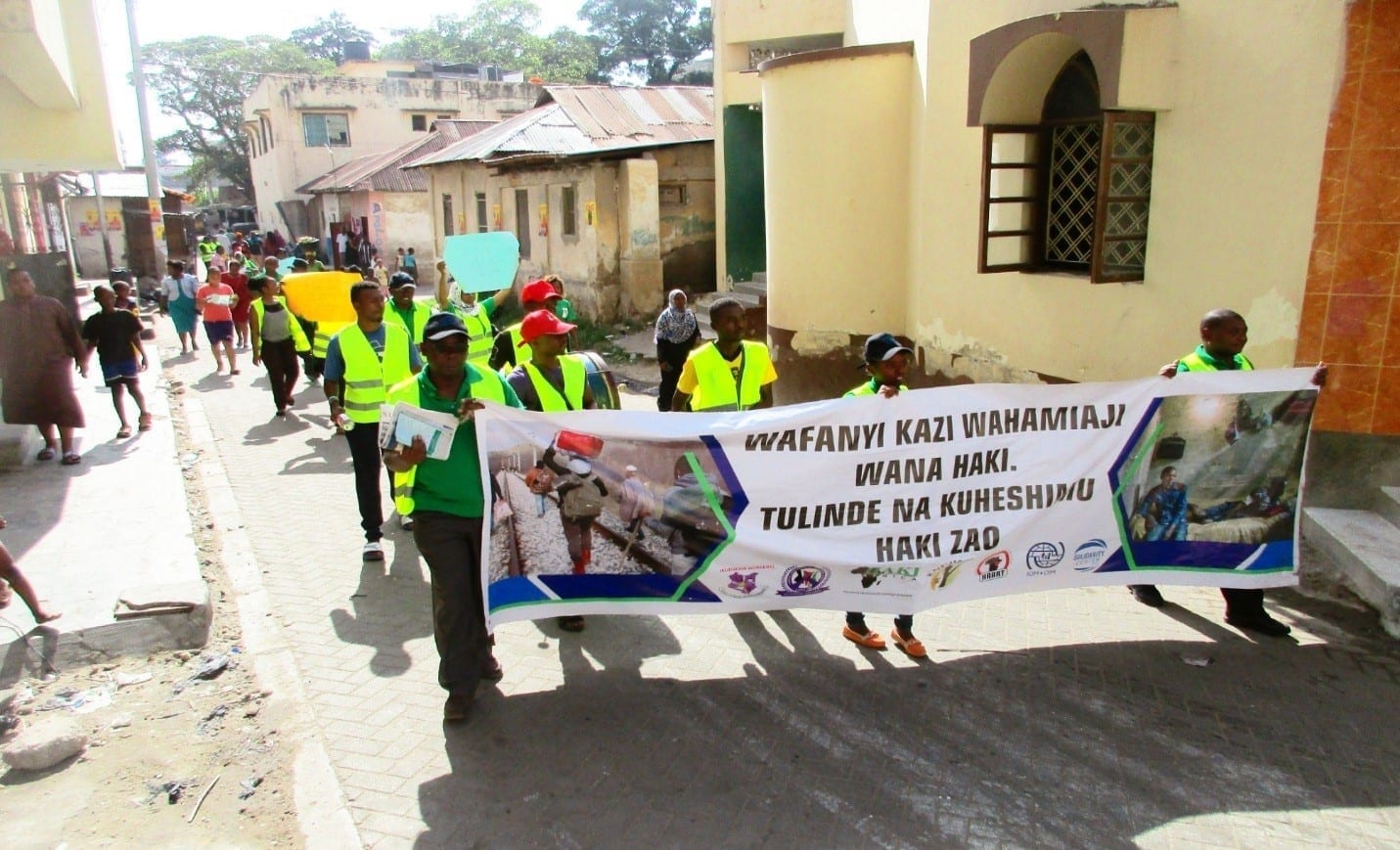
KUDHEIHA joins with local allies in a street mobilization in the Majengo area in Mvita in August 2017, inviting the public to a labor migration forum located at the chief`s office in Majengo. Credit: Solidarity Center
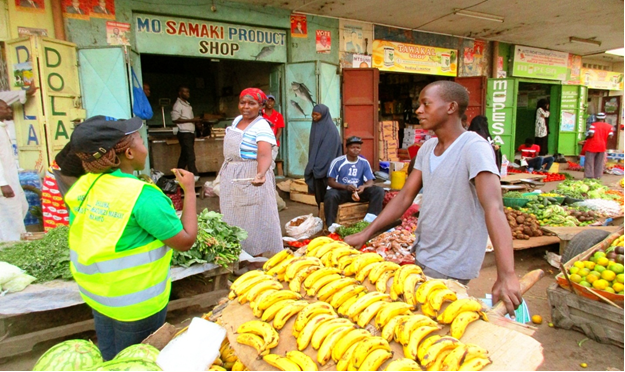
KUDHEIHA staff hand out information booklets for Kenya`s migrant workers in a market in Majengo, inviting market vendors to a public forum on safe migration. Credit: Solidarity Center
The Safe Migration Forum in the Majengo area of Mvita was opened by the local chief and attended by village elders and local administrators, including the county commissioner, as well as by members of the general public. There they learned from former migrant domestic workers to various Gulf countries that unscrupulous labor brokers in Kenya and elsewhere often will not show migrating workers their contracts until they are at the airport or bus station, and frequently, the contracts are written in Arabic or a language the workers cannot understand. When they arrive at their destination, the contracts and promised salaries may even change.
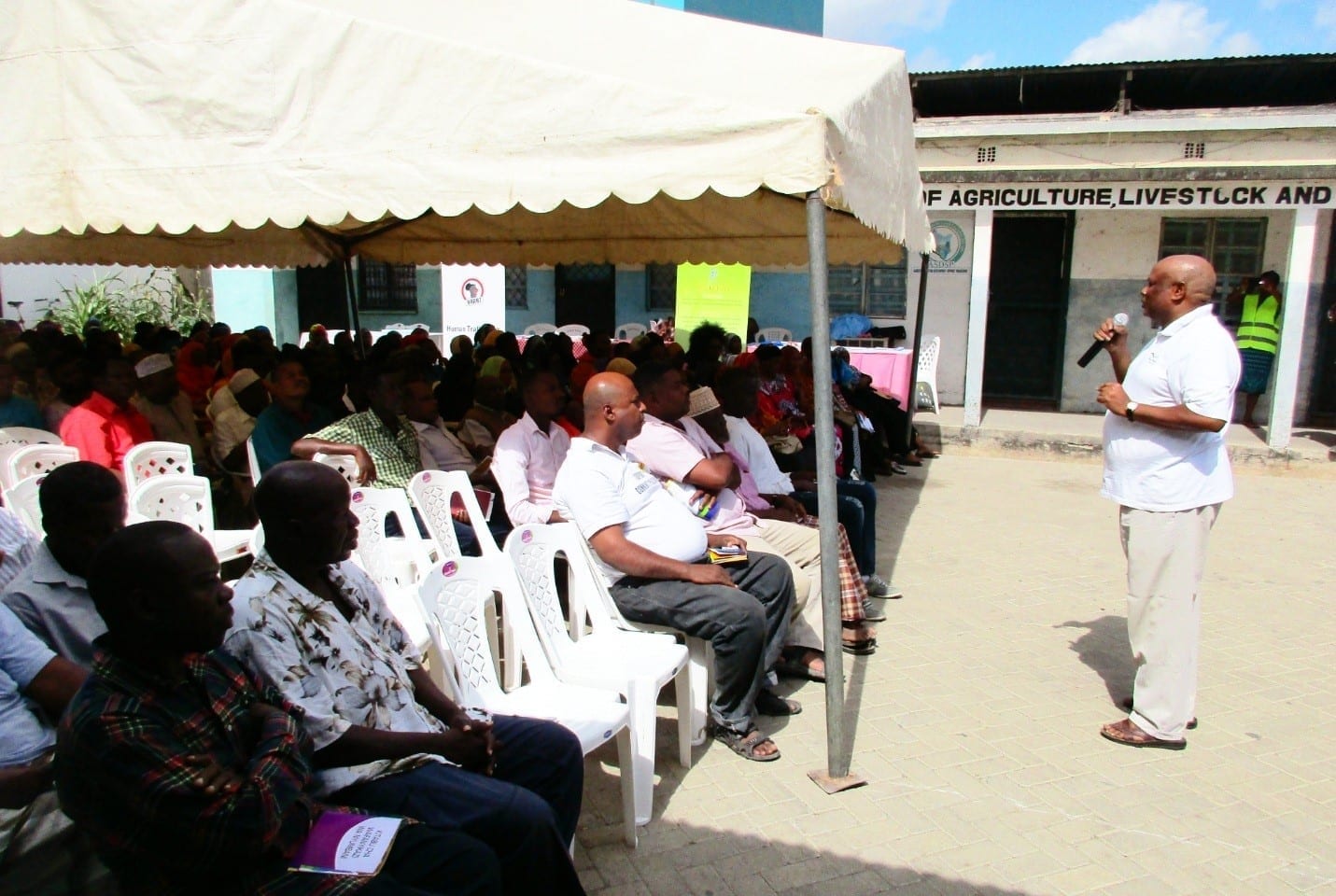
Bakari Mwakifunga, Mikindani constituency chief, opens the Safe Migration Forum, attended by member of the public, village elders and local administrators, including the county commissioner. Credit: Solidarity Center
Mikindani constituency – Bakari Mwakifunga
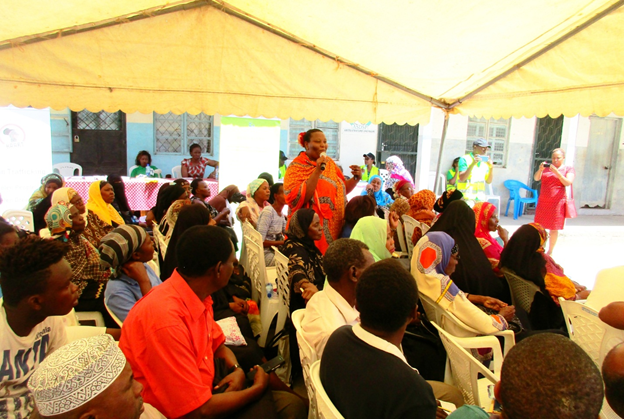
A Safe Migration Forum participant shares her experience as a migrant worker in Jordan. Credit: Solidarity Center
In Nairobi, hundreds of domestic workers rallied in front of the Kenya Parliament on February 21, 2018, advocating for legislators to ratify International Labor Organization (ILO) Convention 189, Decent Work for Domestic Workers. The effort is part of a larger campaign to improve wages and working conditions for the country’s domestic workers by (KUDHEIHA) as well as to help build momentum for a global movement for domestic workers. Although the convention went into force in 2013, it has been ratified by only 23 countries. Of these, only two African countries have ratified the convention: South Africa and Mauritius.

Kenya.C189 Rally.Banner.SC.2.18
KUDHEIHA’s push for government ratification of Convention 189 this year is an effort to secure additional recognition, rights and standards for Kenyan domestic workers working inside and outside the country. That effort is part of a larger campaign to help build momentum for a global movement for domestic workers as well as improve wages and conditions for the country’s domestic workers by KUDHEIHA. Convention 189 established the first global standards for the more than 50 million domestic workers worldwide, addressing wages, working conditions, benefits, labor brokers and child labor.
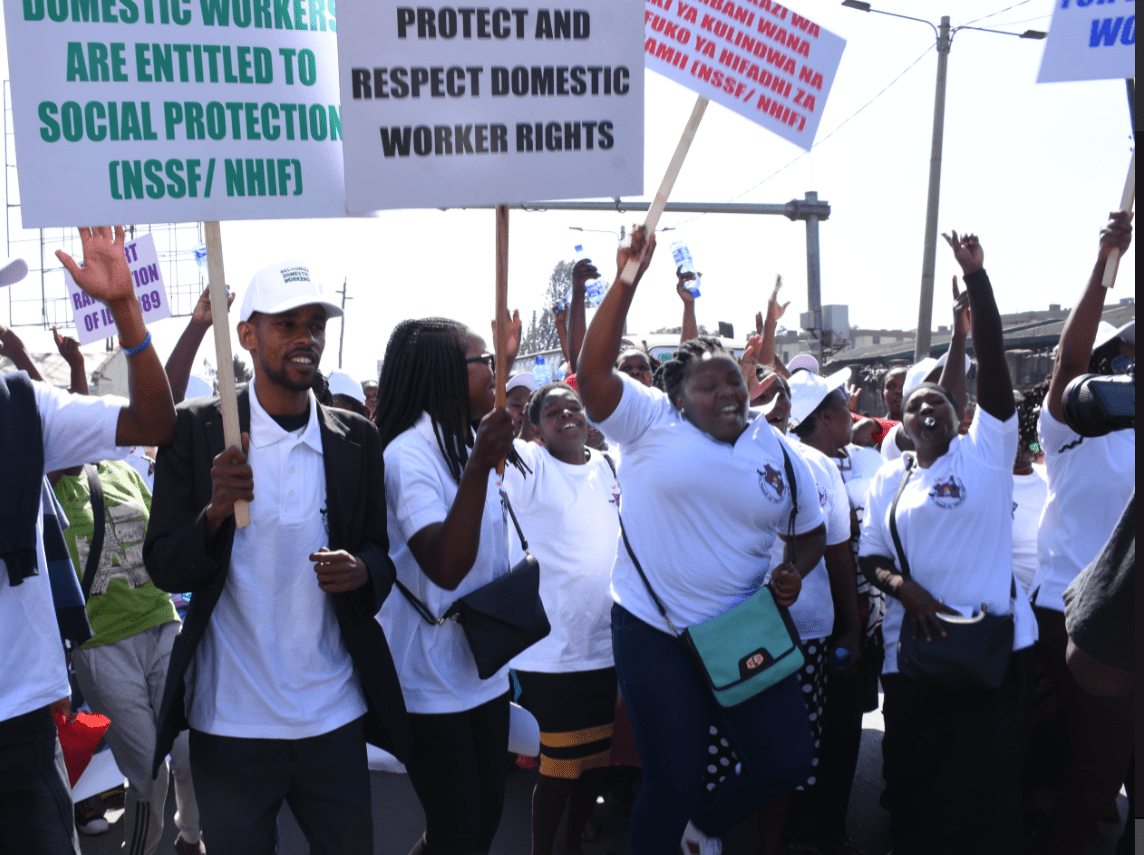
Domestic workers and supporters rally in front of the Kenya Parliament in Nairobi on February 21, 2018, advocating for legislators to ratify International Labor Organization (ILO) Convention 189, Decent Work for Domestic Workers. Credit: Solidarity Center
“It is amazing. It shows [the] power of the domestic workers in Kenya,” said Vicky Kanyoka, Africa regional coordinator for the International Domestic Workers Federation (IDWF).
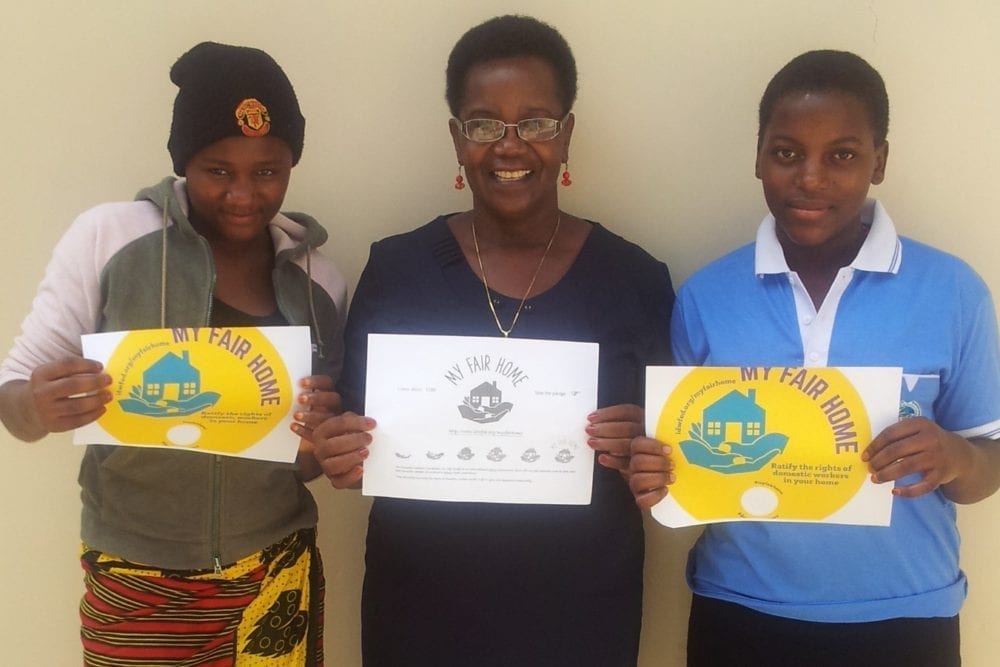
Credit: IDWF
On June 16, International Domestic Workers Day, we honor the women who make other people’s lives easier. This day, as every day, the Solidarity Center is committed to helping domestic workers attain safe and healthy workplaces, family-supporting wages, dignity on the job and greater equity at work and in their community. The Solidarity Center works with domestic workers and other organizations that represent them around the world, including in Cambodia, Costa Rica, Dominican Republic, El Salvador, Hong Kong, Indonesia, Jordan, Kenya, Liberia, Mexico, South Africa and Sri Lanka.
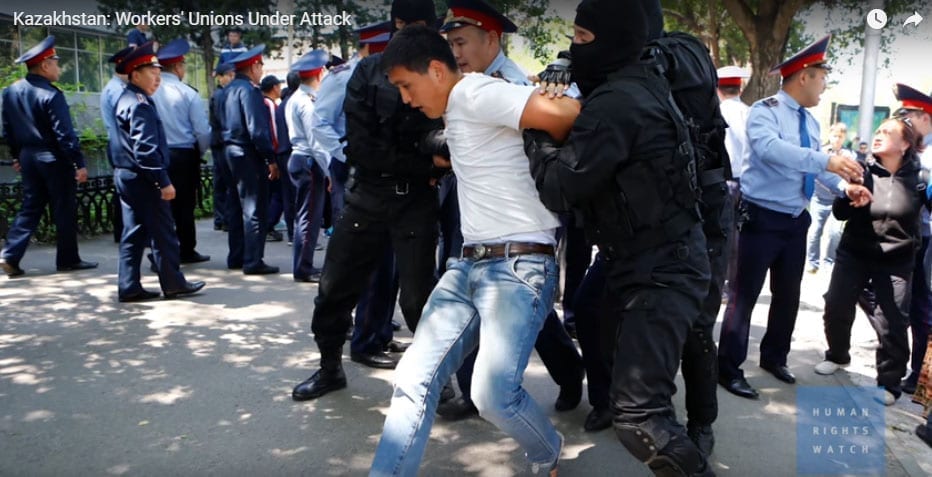
Jun 7, 2018
Some 65 percent of countries now exclude entire categories of workers from labor law protections, while 81 percent of countries deny some or all workers collective bargaining, as democratic space for workers closes around the world, according to a new report.
Released today, the International Trade Union Confederation (ITUC) Global Rights Index 2018 reports that over the past year, trade unionists were murdered in nine countries—Brazil, China, Colombia, Guatemala, Guinea, Mexico, Niger, Nigeria and Tanzania—as the number of countries in which workers are exposed to physical violence and threats increased by 10 percent, from 59 to 65. In Colombia alone, 19 trade unionists were murdered last year—nearly double the 11 murders of the previous year.
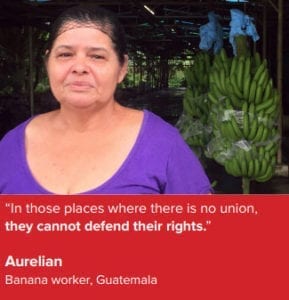 The number of countries where workers are arbitrarily arrested and detained increased from 44 in 2016 to 59 in 2017. Some 87 percent of countries violated the right to strike. Of 142 countries surveyed, 54 deny or constrain free speech and freedom of assembly.
The number of countries where workers are arbitrarily arrested and detained increased from 44 in 2016 to 59 in 2017. Some 87 percent of countries violated the right to strike. Of 142 countries surveyed, 54 deny or constrain free speech and freedom of assembly.
The 10 worst countries for overall worker rights violations are Algeria, Bangladesh, Cambodia, Colombia, Egypt, Guatemala, Kazakhstan, the Philippines, Saudi Arabia and Turkey.
“Democracy is under attack in countries that fail to guarantee people’s right to organize, speak out and take action,” says ITUC General Secretary Sharan Burrow.
The Middle East and North Africa was again the worst region for treatment of workers, with the kafala system in the Gulf still enslaving millions of people. “The absolute denial of basic workers’ rights remained in place in Saudi Arabia,” according to the ITUC.
Haiti, Kenya, Macedonia, Mauritania and Spain have all seen their rankings worsen in 2018, with a rise in attacks on worker rights in law and practice.
The 2018 ITUC Global Rights Index rates 142 countries from one to five according to 97 internationally recognized indicators to assess where worker rights are best protected in law and in practice. The Index assigns an overall score placing countries in rankings of one to five.
1 Sporadic violations of rights: 13 countries, including Ireland and Denmark
2 Repeated violations of rights: 23 countries, including France and Estonia
3 Regular violations of rights: 26 countries, including Spain and Macedonia
4 Systematic violations of rights: 38 countries, including Haiti and Kenya
5 No guarantee of rights: 32 countries including, Honduras and Nigeria
5+ No guarantee of rights due to breakdown of the rule of law: 10 countries
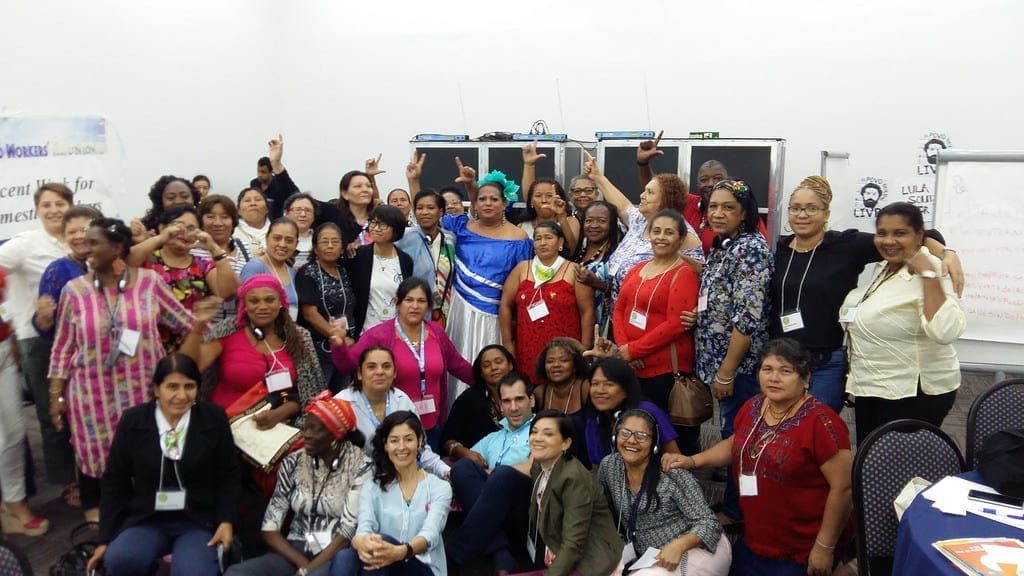
May 16, 2018
Some 40 domestic workers from 17 countries across North and South America and the Caribbean shared organizing tactics, hammered out resolutions and participated in Solidarity Center training on gender-based violence at work at a recent conference in São Paulo, Brazil.

A Solidarity Center gender equality training was part of the domestic workers’ conference. Credit: IDWF
The conference is one of a series of regional planning meetings domestic workers around the world are holding in advance of the International Domestic Workers Federation (IDWF) congress November 16–18 in South Africa. Domestic workers from all regions will bring recommendations to the IDWF Congress. Latin American domestic workers voted to recommend the IDWF adopt resolutions involving safety and health, strengthening leadership of Afro-descendent domestic workers where they are a majority and supporting LGBT domestic workers who face double discrimination on the job.
Delegates also nominated new leadership for the region, Andrea Morales from Nicaragua and Carmen Britez of Argentina, both former domestic workers.
In one of the most powerful moments of the conference, migrant domestic workers and Afro-descendent domestic workers shared their strategies during a panel on racial equality and, in the process, “restored dignity back to themselves and to the work they do,” says Adriana Paz, IDWF Latin America regional coordinator.
“Most domestic workers labor in modern slavery conditions without being paid but instead just provided with board and room—just like in slavery times,” says Paz, who participated in the conference. “Added to this lack of rights and freedoms, Afro-descendant domestic workers face the structural violence inflicted on them because of the intersection of their race, class and gender.”
In Brazil, 70 percent of domestic workers are Afro-descendent as are a majority of domestic workers in Colombia, who also are often internal migrants, moving from rural areas to large cities for employment.
Steps to Ensure Brazil Enforces Domestic Worker Standard
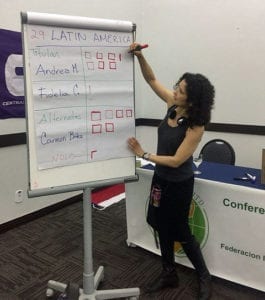
Credit: IDWF
Brazil’s ratification of International Labor Organization Convention (ILO) 189 on domestic workers’ rights earlier this year led to discussions about how Brazilian domestic workers could ensure the government is in compliance with the convention. Domestic workers from countries that have ratified Convention 189 say the first step is to push for creation of employer organizations so domestic workers have a collective employer with whom to negotiate contracts.
Enforcement of domestic workers’ rights is difficult in Brazil because the constitution does not allow authorities to “inspect” private homes, a challenge Argentine domestic workers say they have addressed by sending out mobile vans in neighborhoods where they find employers with domestic workers. From the vans, union staff and labor ministry representatives discuss with employers how to formalize workers and have paperwork ready for employers and specific materials for domestic workers as well.
Conference participants also took part in a Solidarity Center workshop on the upcoming International Labor Conference (ILC), where representatives from labor, employers and governments will negotiate a draft convention addressing gender-based violence at work. Five domestic workers from Latin America will attend the May 28–June 8 ILC, all of whom were active in the international campaign for passage of Convention 189 in 2011.
Domestic workers in the Africa, Asia and European regions held regional conferences earlier this year.
May 11, 2018
David Welsh, country director in Southeast Asia for the Solidarity Center, a U.S.-based workers’ rights organization, says major clothing companies fail to prioritize their employees. “The brands control and seek out specific market dynamics, and it’s a deliberately exploitative system,” he noted.
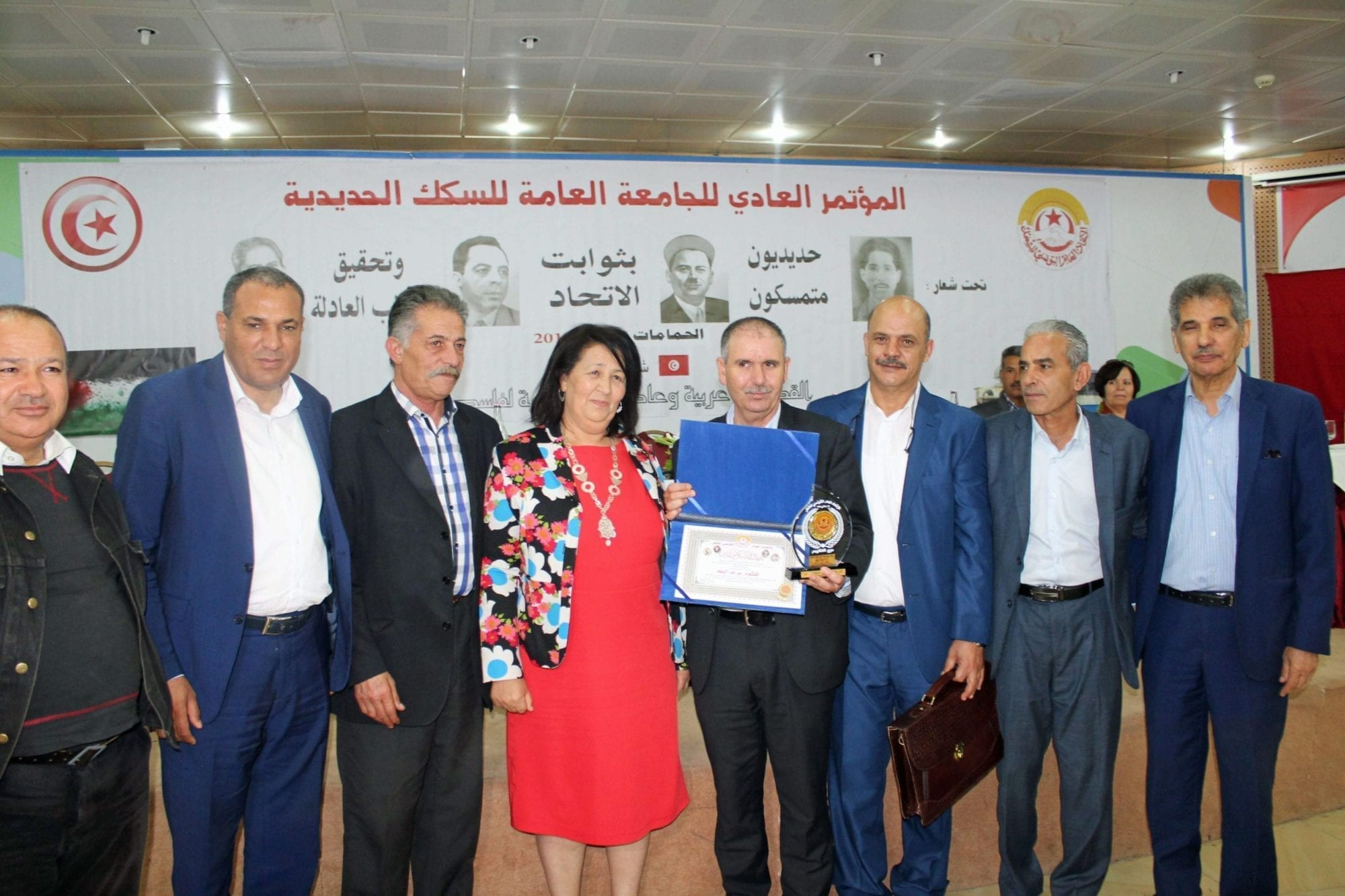
May 9, 2018
Kalthoum Barkallah, Solidarity Center senior program officer and master trainer in Tunisia, this week received a lifetime achievement award from the General Union of Tunisian Workers (UGTT). The award, the nationwide union’s highest honor, is given to union activists for their dedication to union work and in recognition of their struggle in the defense of workers and human rights.

The UGTT award is the union’s highest honor.
“We are enormously proud of Kalthoum and the great contribution she brings to the labor movement through her incredible dedication and accomplishments,” says Hind Cherrouk, Solidarity Center country program director for the Maghreb region. “Kalthoum’s expertise in nurturing and training new generations of leaders, especially women unionists, has ensured the labor movement in Tunisia and beyond is served by new, skilled union activists.”
Presented by UGTT General Secretary Noureddine Tabboubi, the award reads: “Honoring sister and union activist Kalthoum Barkallah in appreciation for her dedication and perseverance in support for union work.”
In conferring the award, Taboubbi noted Kalthoum’s popularity among the UGTT’s union structures from local to national.
“When I began the struggle for democracy, freedom and the rights of women in 1979, I never for a moment imagined that there would be a day when I would be recognized or honored for my part in realizing these noble objectives,” says Barkallah.
Building Women’s Leadership in Their Unions
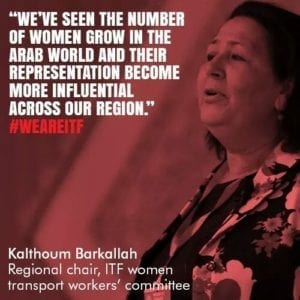 As an activist with the Tunisian General Federation of Railways, Barkallah was first elected as a deputy general secretary in 1983, heading up training within the union. She later was elected deputy general secretary in charge of international relations. In the railways industry, Barkallah was known as the “iron lady” for her determination and struggle to challenge her male colleagues in a male-dominated sector to achieve equality and justice for all.
As an activist with the Tunisian General Federation of Railways, Barkallah was first elected as a deputy general secretary in 1983, heading up training within the union. She later was elected deputy general secretary in charge of international relations. In the railways industry, Barkallah was known as the “iron lady” for her determination and struggle to challenge her male colleagues in a male-dominated sector to achieve equality and justice for all.
As an active union leader with the UGTT, Barkallah built on the gender empowerment training she began in the railway sector to reach union members in a variety of industries throughout Tunisia, championing women’s rights there and supporting her sisters beyond its borders.
Barkallah, who in 2006 was elected president of the International Transport Workers’ Federation (ITF)–Arab Women’s committee, also recently received an award from the ITF Women’s Committee for her fight and struggle in support of women workers in the transport sector.
Throughout her decades of service to workers and their unions, Barkallah balanced both work and family duties, raising two sons who each now have their own children.











 The number of countries where workers are arbitrarily arrested and detained increased from 44 in 2016 to 59 in 2017. Some 87 percent of countries violated the right to strike. Of 142 countries surveyed, 54 deny or constrain free speech and freedom of assembly.
The number of countries where workers are arbitrarily arrested and detained increased from 44 in 2016 to 59 in 2017. Some 87 percent of countries violated the right to strike. Of 142 countries surveyed, 54 deny or constrain free speech and freedom of assembly.




 As an activist with the Tunisian General Federation of Railways, Barkallah was first elected as a deputy general secretary in 1983, heading up training within the union. She later was elected deputy general secretary in charge of international relations. In the railways industry, Barkallah was known as the “iron lady” for her determination and struggle to challenge her male colleagues in a male-dominated sector to achieve equality and justice for all.
As an activist with the Tunisian General Federation of Railways, Barkallah was first elected as a deputy general secretary in 1983, heading up training within the union. She later was elected deputy general secretary in charge of international relations. In the railways industry, Barkallah was known as the “iron lady” for her determination and struggle to challenge her male colleagues in a male-dominated sector to achieve equality and justice for all.